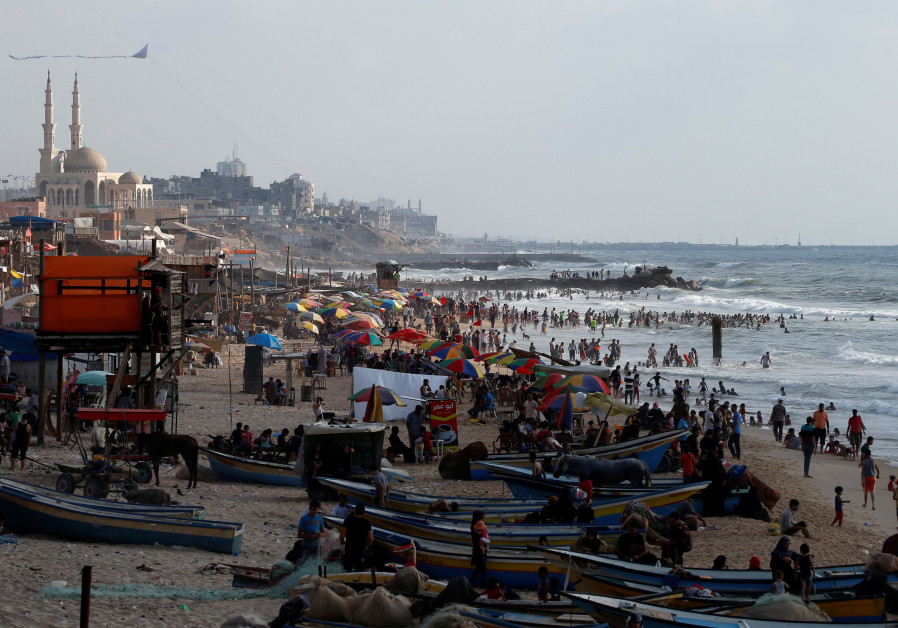Analysis: How will ICC view new evidence regarding Gaza Beach war crimes?

Gazans swim in the Mediterranean Sea as others enjoy their time on a beach in the northern Gaza Strip July 13, 2018.. (photo credit: MOHAMMED SALEM/ REUTERS)
On Saturday, the Intercept published an exposé of new evidence in the IDF’s internal case file regarding the July 16, 2014, incident in which the IDF killed four unarmed Palestinian minors at Gaza Beach.
War was already raging between Israel and Hamas when the incident occurred in view of a throng of journalists who copiously recorded the event and whose photos went viral online.
How will the International Criminal Court, which is reviewing alleged war crimes allegations against the IDF for its 2014 Gaza war conduct, view the new evidence?
In June 2015, the IDF announced it was closing its criminal investigation into the incident, essentially saying the killings were a tragic mistake in the fog of war.
That conclusion already got serious push back shortly after through a report by former US judge Mary McGowan-Davis on behalf of the UN Human Rights Council.
Where the IDF saw mistaken intelligence with no intent to kill civilians, the UNHRC saw a deliberate attack or a dangerous willful indifference to the weakness of the available intelligence.
The IDF viewed the beach area where the incident occurred as a combat zone where Hamas naval commandos had met and which it had struck just the day before.
(function(w,d,s,i){w.ldAdInit=w.ldAdInit||[];w.ldAdInit.push({slot:10834723912266086,size:[0, 0],id:”ld-9628-9059″});if(!d.getElementById(i)){var j=d.createElement(s),p=d.getElementsByTagName(s)[0];j.async=true;j.src=”//cdn2.lockerdomecdn.com/_js/ajs.js”;j.id=i;p.parentNode.insertBefore(j,p);}})(window,document,”script”,”ld-ajs”);
The UNHRC viewed the beach as a clear and non-combat area that was close enough to civilian areas to warrant extreme caution with the use of force.
What was not yet public until Saturday’s report by the Intercept, was that the IDF personnel involved in the drone attack had briefly harbored doubts about whether the minors were combatants or not, and even asked intelligence officials for clarification.
They asked for clarification after firing a first missile, killing one of the minors, but before firing the second, which killed the other three.
The Intercept report says when the clarification did not come back within 30 seconds, they fired the second missile.
But those 30 seconds of doubt create a potentially new analysis.
If there was doubt, then can the decision to fire a second time without waiting for clarification lead to a case to prove intent where before such a case was either nonexistent or vague?
Adalah, a non-profit legal center that is representing the Palestinian families whose children were killed, made the argument that this point and others in the case file provide a basis to ask more questions, question more witnesses and ultimately indict.
The Jerusalem Post has learned the IDF’s basis for closing the case took into account all the information which the Intercept has now made public.
The main difference between Adalah’s and the Intercept report’s criticism of the IDF for not pursuing the case further in light of the doubt is different world-views about what doubt means in war.
The Post has learned the IDF view would be that doubt in war is common and very few attacks taking place in urban warfare have full scientific accuracy about the identity of the target.
According to this view, if this had been a targeted killing operation during peacetime, then maybe there would have been more of a basis to wait for additional clarifications.
However, the IDF would say the full-fledged war, which was in motion, and the factor of Hamas’s naval commandos having just recently launched a clandestine attack on an IDF position were also part of the picture.
In that light, the IDF did not think it could risk the possibility of letting the presumed commandos scatter to a point where many would escape to attack the IDF another day, even if there was some doubt about their identity.
This means that the IDF view is that the newly reported doubt was not significant, was run of the mill for war, and was far from enough to be used to make a case for intentional killing beyond a reasonable doubt.
Adalah will not accept this explanation, and is still asking Attorney-General Avichai Mandelblit, himself a former IDF chief lawyer, to order the probe reopened for the questions of doubt and of the sufficiency of the intelligence to be plumbed.
Of course, the ultimate question is what the ICC prosecution will decide.
On one hand, it has shown a readiness to disassociate itself from the conclusions of the UNHRC and it has even fought hard to close a case against the IDF relating to the 2010 Mavi Marmara flotilla incident.
On the other hand, it has accepted Palestine as a state.
It has also never publicly recognized the difference between the IDF’s code and investigations of its own soldiers, however imperfect, versus Hamas’s open season on civilians and failure to investigate itself at all.
There is no question though the new evidence makes clearer than ever what the fault lines are in evaluating questions of international law, war and human rights.






Comments are closed.